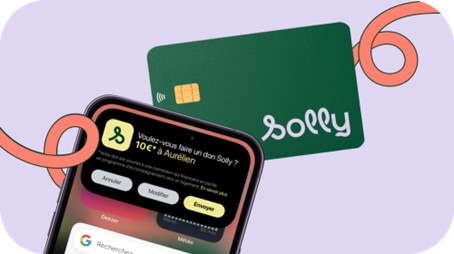Solly reinvents payments for people in need

Une nouvelle solution solidaire et technologique vient de voir le jour pour aider les personnes sans domicile fixe. Il s’agit de Solly, qui combine une carte de paiement, une acceptation contrôlée des paiements, ainsi que la technologie NFC, le tout permettant aux passants de faire des dons aux sans-abri facilement via leurs smartphones.
FACTS
-
Solly, a solidarity card project, recently launched its fundraising campaign to support the launch of its project. The aim is to offer homeless people a dematerialised solution for collecting donations.
-
Still at the development stage, Solly is set to re-use tools such as payment cards and NFC technology on smartphones, adapting them to a very specific use.
-
How it works is simple:
-
Solly wants to distribute payment cards to the homeless during outreach work carried out by associations. Each card will be linked to an account specific to the owner of the card.
-
When passers-by wish to make a donation to the owner of a Solly card, they simply need to hold their phone up to the owner's payment card to open a dedicated page on their smartphone, using NFC technology.
-
In just a few seconds, the passer-by will fill in the amount of the donation they wish to make before validating their payment.
-
The donation will be allocated to the beneficiary's kitty, who will then be able to use their Solly card to purchase essential goods only.
-
-
Card owners will receive around 90% of donations, with the remainder used to cover Solly's management costs and housing assistance projects.
-
In order to guarantee financial autonomy, Solly intends to form partnerships with financial institutions. Users will be able to access their account balances directly via ATMs.
-
Tests should be carried out at the end of 2024 to ensure the viability of this method of operation.
CHALLENGES
-
Combining solidarity and technology: Solly aims to reduce the gap between people in need and the digitisation of payments. The decline in the use of cash is making it difficult for the homeless to collect donations. In its own way, Solly revolutionises the use of current technologies by adapting them to people who are cut off from these new solutions. It's an ingenious way of combining solidarity and digital technology.
-
Access to basic necessities: The Solly card is based on a system similar to that of restaurant vouchers, and includes acceptance constraints on the products purchased, enabling spending to be limited to food, health, hygiene and other products. Solly is thus demonstrating a new use case for cards whose acceptance is restricted. This technology makes it possible to instantly refuse a transaction if it does not comply with the predefined standards for card use. For Solly, this guarantees a relationship of trust with donors, who can rest assured that their donations will be used wisely.
MARKET PERSPECTIVE
-
Solly is not the first solidarity project based on payment technologies. In 2020, Unity Card aimed to offer a solution to help people who had been left behind. This involved distributing prepaid cards, the balance of which was available via a QR code on the card that was also visible to the authorities distributing the cards. This solution made it possible to help people in need while ensuring that the purchases made were essential.
-
On the corporate side, initiatives such as the Donablue card have enabled donations to be made via business payments. Every payment made with the card is rounded up to the nearest euro. The sums are then donated to charities.
